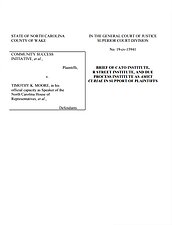The Cato Institute is dedicated to advancing the principles of individual liberty, free markets, and limited government. The Cato Institute’s Project on Criminal Justice was founded in 1999 and focuses on the proper role of criminal sanctions in a free society, the scope of substantive criminal liability, the proper and effective role of police in their communities, the protection of constitutional and statutory safeguards for criminal suspects and defendants, citizen participation in the criminal justice system, and accountability for law enforcement officers. The R Street Institute’s mission is to engage in policy research and educational outreach that promotes free markets and limited yet effective government, including properly calibrated legal and regulatory frameworks that support economic growth and individual liberty. And the Due Process Institute works to honor, preserve, and restore procedural fairness in the criminal justice system. Founded in 2018 and guided by a bipartisan Board of Directors, the Due Process Institute creates and supports achievable solutions for challenging criminal legal policy concerns through advocacy, litigation, and education.
Under North Carolina law, a citizen convicted of any felony—whether under North Carolina law, federal law, or the criminal code of another state—loses the fundamental right to vote. N.C.G.S. § 163–55(a)(2). That right can be restored only after an ex-offender has been “unconditionally discharged” from probation, parole, and post-release supervision. N.C.G.S. § 13–1. Ex-offenders thus remain disenfranchised for lengthy periods of time after their release from incarceration. Moreover, before regaining voting rights, citizens must pay court costs, fees, and restitution as “conditions” of their probation, parole, or post-release supervision. Id. §§ 15A-1343(b)(9), 15A-1374(b)(11a)-(11b), 15A-1368.4(e)(11)-(12). Failure to pay those often substantial costs can result in lengthy extensions of probation or parole—and consequently continued deprivation of the franchise. See id. §§ 15A-1342(a), 15A-1344(d); Pls.’ Mot. Summ. J. 14–15.
Amici are concerned that this system of criminal disenfranchisement harms citizens and taxpayers, and is inconsistent with multiple provisions of the North Carolina Constitution. Criminal disenfranchisement was historically limited to those crimes considered particularly serious and violative of the basic social order. Today, by contrast, citizens can be deprived of the right to vote even for substantively minor and technical violations. Whether or not disenfranchisement is justifiable when applied to the extraordinary crimes for which it was originally imposed, it certainly cannot be justified in its broad modern incarnation.
As disenfranchisement has become increasingly common, its impacts on ex-offenders, families, communities, and the democratic process have only grown. Disenfranchisement harms individuals by severing ties to society and increasing the risk of recidivism, harms families by decreasing their civic participation, harms communities by removing their voice in governance, and harms democracy itself by raising the possibility that elections (and the criminal laws enacted by elected representatives) do not truly represent the will of a majority of citizens.
These detrimental effects are further compounded by North Carolina’s growing reliance on “user-funded” criminal justice. User-funded justice—under which an ever-growing array of criminal fines and fees are expected to fund not only the justice system, but other aspects of government as well—traps criminal defendants in a cycle of debt and poverty. And because N.C.G.S. § 13–1 restores voting rights only after ex-offenders have been unconditionally discharged from all aspects of their sentence—including the payment of court costs, fines, fees, and restitution—access to the franchise could, in many cases, turn exclusively on a citizen’s wealth.
These features of the current disenfranchisement regime harm taxpayers and raise serious constitutional concerns under multiple provisions of the North Carolina Constitution. Amici thus respectfully submit this brief in support of Plaintiffs’ motion for summary judgment.



